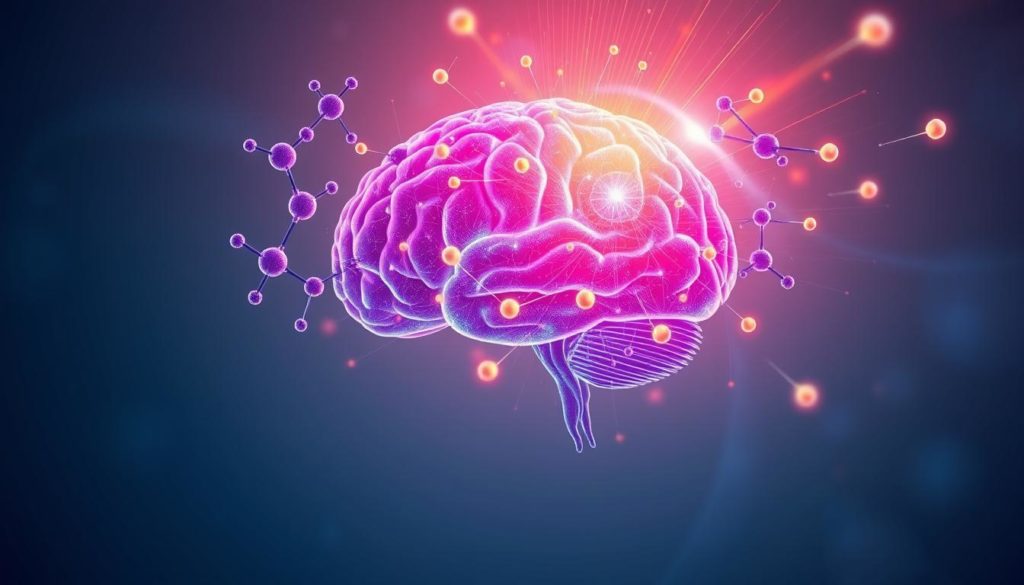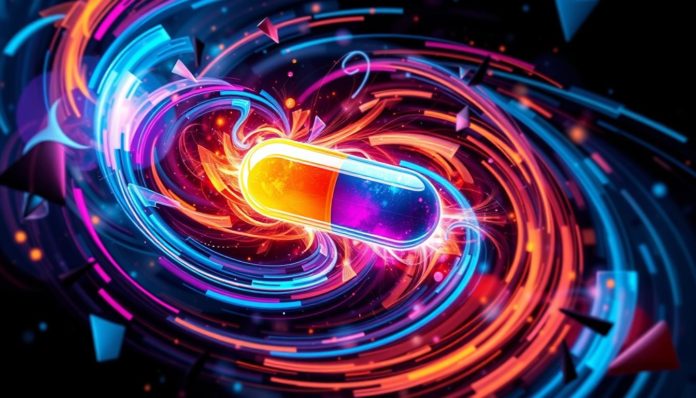About 6.1 million kids in the U.S. have ADHD, and many take medicine like Dexedrin. This drug helps control ADHD and symptoms of narcolepsy. It boosts focus, lowers impulsivity, and helps with hyperactivity by stimulating the CNS.
But, Dexedrin can have side effects and might be misused. As a Schedule II stimulant, it’s vital to follow your doctor’s advice closely. This article will go over Dexedrin’s uses, effects, and key points. This way, you can understand its pros and cons better.
What is Dexedrine?
Dexedrine, also called dextroamphetamine sulfate, is a strong CNS stimulant. It treats ADHD and narcolepsy. Being a Schedule II Stimulant means it’s powerful. Controlled use is required.

Understanding Dexedrine as a CNS Stimulant
Dexedrine boosts focus and lessens fidgeting as a CNS stimulant, making it great for ADHD. It aids narcolepsy patients by keeping them awake. It cuts down on too much daytime sleepiness.
Brand Names and Availability
Dexedrine comes in different brand names. This offers treatment flexibility. Common brands are:
- Dexedrine Spansules
- Dextrostat
- ProCentra
- Zenzedi
These brands give patients and doctors many choices. They match various needs and likes.
Dexedrine in ADHD and Narcolepsy Treatment
Dexedrine helps ADHD patients focus more and be less hyper. It’s really effective. For narcolepsy, it keeps people alert and fixes sleep patterns. This Schedule II Stimulant is key.
Dexedrine’s role in treating ADHD and narcolepsy proves its value. It’s effective and comes in many brands. It offers a sensible way to manage these issues.
How Dexedrine Works
Dexedrine is a strong CNS stimulant that works by increasing brain neurotransmitters like dopamine and norepinephrine. These chemicals boost alertness, focus, and how well the brain works. It’s key in treating ADHD, helping to lessen its symptoms significantly.

The dextroamphetamine mechanism of action is twofold. It stops dopamine and norepinephrine from being absorbed back into neurons. It also pushes these neurotransmitters into the gaps between neurons. This boosts the brain’s transmission of attention and behavior control signals.
For people with ADHD, Dexedrine helps complete tasks, act less impulsively, and control emotions better. It’s important in ADHD care alongside educational and psychological help.
| Key Neurotransmitters | Resulting Effect |
|---|---|
| Dopamine | Improved focus and motivation |
| Norepinephrine | Enhanced alertness and attention |
Differences Between Dexedrine and Adderall
Dexedrine and Adderall are both used to help with ADHD and narcolepsy. But, they’re not the same in what they’re made of or how they work. Knowing how they differ is key to finding the best treatment for a person.
Dexedrine vs. Adderall: Key Differences
Dexedrine only has dextroamphetamine, while Adderall mixes dextroamphetamine and levoamphetamine. This difference changes how effective the drugs are. It also affects what side effects a person might have.
Effectiveness and Side Effects
People often feel different levels of effectiveness between these two drugs. Some find Dexedrine stronger because it has only one type of stimulant. But Adderall’s mix might work better for others, covering a wider range of issues. The side effects also vary, leading to a preference for one drug over the other for some patients.
Drug Composition and Usage
The ingredients in Dexedrine and Adderall affect how they’re used. Dexedrine comes in various doses and forms, like tablets or extended-release capsules. Adderall’s mix offers immediate and extended-release forms. This lets doctors create treatment plans that work well while keeping side effects low.
Dexedrin: Dosage Information
Figuring out the right dosage of Dexedrine involves many factors. A patient’s age, metabolism, and health needs are key. It’s important to know the difference between short-acting and long-acting Dexedrine. This helps ensure the treatment works well and is followed correctly.
Short-acting vs. Long-acting Dexedrine
There are two forms of Dexedrine: short-acting and long-acting. Short-acting Dexedrine works for 4-6 hours. It’s good when you need it to start working fast but not last all day. On the other hand, long-acting Dexedrine lasts up to 12 hours. It’s better for those who need symptom control all day.
Dosage Variations by Age and Metabolism
The dosage of Dexedrine changes based on age and metabolism. Kids and teens get lower doses. Their bodies react differently than adults. Adults might need different doses depending on how fast their body processes the drug.
Importance of Following Prescription Instructions
It’s crucial to follow the Dexedrine prescription exactly. Prescription adherence helps you get the most benefit and lowers risks. Always do what your healthcare provider says. Talk about any side effects right away. It’s also important to check if the dosage still works for you regularly.
Common Side Effects of Dexedrine
Dexedrine can really help with ADHD and narcolepsy. However, it’s key to know about the side effects. Being informed helps manage them better.
Digestive System Side Effects
Dexedrine might upset your digestive system. People might feel stomach aches, lose their appetite, or feel nauseous. These issues usually aren’t severe and can be handled. If they don’t go away, it’s best to see a doctor.
Central Nervous System Side Effects
The drug mainly acts on the central nervous system. This can cause headaches, dizziness, and feeling edgy. These effects are common but keep an eye on them. If they get worse, tell your doctor right away.
Cardiovascular Side Effects
Some folks might see changes in their heart health. This includes higher blood pressure and a faster heartbeat. Knowing about these helps manage them with regular checks and doctor visits.
| Type of Side Effect | Common Issues |
|---|---|
| Digestive System | Stomach upset, appetite loss, nausea |
| Central Nervous System | Headaches, dizziness, nervousness |
| Cardiovascular | Elevated blood pressure, increased heart rate |
Knowing Dexedrine’s common side effects is smart. It helps patients handle their treatment better. Always talk to your healthcare provider about any side effects of Dexedrine to tackle them quickly.
Serious and Rare Side Effects
Dexedrine helps with ADHD and narcolepsy, but it can have rare and serious side effects. It’s important to watch for any unusual symptoms. If these show up, getting medical help quickly is key.
Severe Allergic Reactions
An allergic reaction to Dexedrine is uncommon but can be serious. You might get a rash, feel itchy, have swelling, get very dizzy, or have trouble breathing. If you notice these, stop the medicine right away and talk to a doctor to avoid more risks from Dexedrine.
Potential for Serotonin Syndrome
Serotonin syndrome is another serious side effect, though it’s rare. It happens when too much serotonin builds up in the brain. Signs include feeling agitated, seeing things, a fast heartbeat, and high blood pressure. You need to get medical help fast if this happens.
Mental and Behavioral Changes
Dexedrine can also cause big changes in behavior and mental health, but this doesn’t happen often. These changes might include severe mood swings, feeling very sad, or seeing things that aren’t there. It’s important to watch these signs closely. Getting help quickly is crucial for the person’s well-being and daily life.
| Severe Side Effect | Description | Action Required |
|---|---|---|
| Severe Allergic Reaction | Symptoms include rash, severe dizziness, and trouble breathing | Immediate cessation and consult healthcare provider |
| Serotonin Syndrome | Marked by agitation, hallucinations, rapid heartbeat | Immediate medical intervention required |
| Mental and Behavioral Changes | Includes mood swings, depression, hallucinations | Close monitoring and medical consultation |
Precautions to Take When Using Dexedrine
When using Dexedrine, it’s important to take certain steps for safety. People need to know about the precautions for using Dexedrine. This includes health issues you may have and how the drug might interact with others.
Health Conditions to Watch For
If you’re considering Dexedrine, think about your health first. Look into how it might affect if you have heart problems, high blood pressure, or mental health history. These conditions can change how your body responds to the medication and might need extra watching.
Interactions with Other Medications
Before starting Dexedrine, tell your doctor about all other medicines, vitamins, or supplements you’re taking. This helps prevent bad drug interactions. Some medications can make side effects worse or reduce Dexedrine’s effectiveness. Sharing a full list is key for safe treatment.
Monitoring During Treatment
It’s smart to monitor how you’re doing on Dexedrine. Check your blood pressure and heart rate often. Watch for changes in your behavior too. This monitoring helps catch any bad effects early and adjust treatment as needed.
To know all possible side effects and Dexedrine precautions, talk with a healthcare provider. Also, look at trusted sources for more information.
Contraindications for Dexedrine
It’s important to know who should not use Dexedrine to stay safe. People with serious heart issues, like advanced arteriosclerosis, shouldn’t take it. Those with high blood pressure that isn’t under control should also avoid it.
Anyone with glaucoma needs to avoid Dexedrine to prevent complications. If you’re allergic to amphetamines, this medication is not safe for you.
Dexedrine can be addictive, so those with a drug abuse history must be very careful. Also, if you’ve taken Monoamine Oxidase Inhibitors (MAOIs) recently, steer clear of Dexedrine to avoid dangerous interactions.
Here’s a quick list of reasons not to use Dexedrine:
| Health Condition | Reason for Contraindication |
|---|---|
| Severe Heart Disease | Increased Cardiovascular Risk |
| Uncontrolled High Blood Pressure | Potential for Dangerous Elevation in Blood Pressure |
| Glaucoma | Risk of Eye Pressure Increase |
| Advanced Arteriosclerosis | Exacerbates Artery Hardening |
| Drug Abuse History | High Potential for Abuse and Dependency |
| Recent MAOI Use | Severe Drug Interaction |
| Hypersensitivity to Amphetamines | Severe Allergic Reactions |
Knowing these contraindications helps keep everyone using Dexedrine safe and healthy.
Interaction with Other Medications
The topic of Dexedrine interactions can be quite complex. This is especially true for how Dexedrine works with other medications. It’s very important to talk about all the medicines you’re taking to keep things safe.
Mixing Dexedrine with monoamine oxidase inhibitors (MAOIs) or certain antidepressants can be dangerous. These combinations can greatly affect drug safety. Be careful when using:
- Blood pressure medications
- Antacids
- Seizure medications
- Common decongestants found in over-the-counter cold or allergy medicines
Understanding Dexedrine interactions is critical because of their serious effects. Each drug listed can impact how well Dexedrine works and its safety. This highlights why talking to healthcare providers is vital for drug safety.
Handling this prescription medication interplay well can change treatment results. It lowers risks and improves how well the medicine works.
Legal Dexedrin Alternatives
When looking for ways to manage conditions treated with Dexedrine, you can find several legal alternatives to Dexedrine. These options range from over-the-counter (OTC) products to natural supplements. Lifestyle changes are also beneficial.
Over-the-Counter Options
If you’re searching for OTC options similar to Dexedrine, consider products with caffeine or mild stimulants. Although not as strong as prescription drugs, these can be effective temporarily and don’t require a prescription.
Natural Supplements
Natural supplements are becoming popular for managing symptoms usually treated with Dexedrine. Some top choices include:
- Omega-3 fatty acids: These are great for brain health.
- Ginkgo Biloba: It’s used for better cognitive function and clarity.
- Bacopa Monnieri: This herb is looked into for improving memory.
Lifestyle Changes
Lifestyle modifications significantly impact symptom management without using medicine. Effective strategies involve:
- Eating a well-rounded diet: Opt for foods that enhance brain performance.
- Staying active: Regular exercises can boost focus and reduce issues.
- Keeping a routine: A structured day-to-day schedule aids in managing symptoms.
Where to Buy Dexedrin Online Safely
Shopping for Dexedrine online should be both convenient and safe. Patients aim to find credible pharmacies online. These pharmacies check prescriptions closely and make sure their medicines are real. Learning how to check if an online pharmacy is reliable is key. This helps patients stay away from fake drugs and keeps them healthy.
Recognizing Reputable Online Pharmacies
It’s essential to identify trustworthy online pharmacies first. These pharmacies are usually licensed by groups like the National Association of Boards of Pharmacy (NABP) in the US. They have a clear address and contact details. This shows they follow the law.
Prescription Verification
Prescription verification is very important too. Real online pharmacies ask for a prescription from a real doctor before selling Dexedrine. This step makes sure the medicine fits the patient’s needs. It also checks the order’s truthfulness, avoiding misuse or abuse.
Avoiding Counterfeit Medications
To stay away from counterfeit drugs, look for pharmacies that share clear sourcing details. They should tell you about the manufacturers and batch numbers. Using sites like the FDA’s website or the NABP’s VIPPS accreditation helps find trustworthy pharmacies. Being careful helps patients dodge fake or dangerous medicines.
FAQ
What is Dexedrine?
Dexedrine is a medicine used mainly for treating ADHD in kids and adults. It’s also for narcolepsy. As a CNS stimulant, it boosts focus, lowers impulsiveness, and controls hyperactivity.
How does Dexedrine work?
Dexedrine increases brain chemicals like dopamine. This helps you stay alert and focused. It’s good for those with ADHD or narcolepsy.
What are the common side effects of Dexedrine?
Taking Dexedrine might cause stomach issues or make you lose your appetite. You could also get headaches, feel dizzy, or nervous. High blood pressure is another possible side effect.
Always tell your doctor if these or any new symptoms show up.
How does Dexedrine differ from Adderall?
Dexedrine and Adderall both treat ADHD but have different ingredients. Dexedrine has dextroamphetamine. Adderall combines dextroamphetamine with levoamphetamine. These differences affect how each drug works and feels.
What is the importance of dosage adherence with Dexedrine?
Following the right Dexedrine dose is key. It makes the medication work best and limits side effects. Your doctor may adjust the dose based on how it affects you.
What are some serious side effects of Dexedrine?
Some serious side effects include severe allergies, serotonin syndrome, and big mood changes. If any of these happen, get help right away.
What precautions should be taken when using Dexedrine?
Before using Dexedrine, think about your health history. Tell your doctor about all medicines you take. Keep an eye on your blood pressure and heart rate, too.
What are the contraindications for Dexedrine?
Don’t take Dexedrine if you have serious heart issues, very high blood pressure, or certain eye problems. It’s also a bad idea if you’ve abused drugs or recently used MAOIs.
What should one know about Dexedrine interactions with other medications?
Dexedrine might not mix well with some meds, like MAOIs or certain blood pressure drugs. Always share your current meds with your doctor to stay safe.
Are there legal alternatives to Dexedrine?
Yes, there are legal, non-prescription ways to manage ADHD. These include natural supplements and lifestyle changes. Eating better, exercising, and having a routine can also help.
How can one buy Dexedrine online safely?
When buying Dexedrine online, look for trusted pharmacies that check your prescription. Make sure the pharmacy is real to avoid fake meds.


